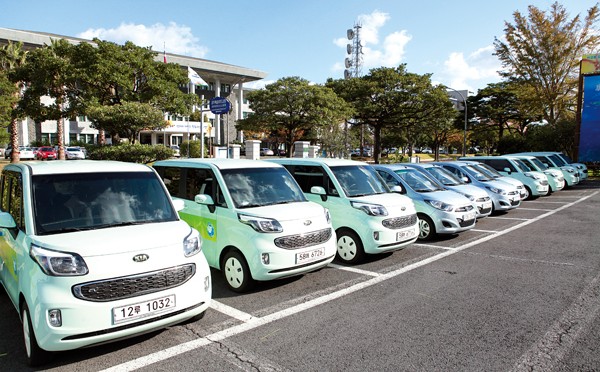Nothing signals Jeju’s com-mitment to green energy like its support for electric vehicles. The first vehicles arrived on the island in 2011 and by Oct. 2013 there were 360 vehicles and 497 refueling stations. 500 more vehicles are due to be added in 2014 and further refueling stations will be added on roads and at tourist sites.
As the world’s only UNESCO Triple Crown, holding World Natural Heritage, Geopark and Biosphere Reserve statuses, preservation of the environment is essential to the Jeju Island brand. Befitting this status, it is well on course to being a global electric vehicle hub with 94,000 electric vehicles projected by 2020, with 100 percent of pri-vate vehicles to be electric by 2030, numbering 371,000.
In line with these goals, the 1st International Electric Vehicle Expo (IEVE EXPO 2014) will be held March 15-21 at the Jeju International Convention Center (ICC Jeju). The seven-day event includes professional confer-ences, exhibitions, test-drive events and leads the “EV MICE Development Project,” part of the “Jeju Mega-Regional Lead-ing Industry: Resort-type MICE Project 2013.”
The event is expected to con-tribute to the advancement of the Korean EV Industry and strengthen its international competitiveness. IEVE EXPO 2014 will also lay the ground-work for the advance of the Asia regional electric vehicle market and synergize the industry through region-wide networks and promotional opportunities for exhibitors and related companies.
Electric vehicle use is a central pillar in achieving Jeju’s carbon-free future. By 2020 provincial officials hope for half of Jeju’s energy to be renewable and by 2030 all of Jeju’s energy will be such. The local MICE industry is also fully committed to this and IEVE follows on the heels of the Wind Energy Asia 2014 expo in February.
The electric vehicle industry has a three-stage plan to guide its success on Jeju Island:
Stage 1 – Completion of the carbon-free pilot model (2013): Smart Grid and carbon-free Gapado
Stage 2 – Carbon-free based development (2020): Smart Grid, electric cars, wind energy and renewables
Stage 3 – Carbon-free island completion (2030): A global fossil-fuel-free city of green growth
These stages are complemented by three central pillars:
Smart Grid: By 2017, the diffusion of Smart Grid businesses and by 2020 complete coverage of Jeju Island.
Electric vehicle use: By 2017, 10 percent of public sector vehicles; by 2020, 30 percent of public transport; by 2030, 100 percent of private vehicles.
Renewable energy: By 2019, 1 GW marine wind energy development; by 2030, 2 GW marine wind energy development.
Guided by these plans and pillars, IEVE EXPO 2014 will promote the electric vehicle industry and boost its public image. The event will boost electric vehicle sales and dis-semination by bringing together government, business and academia. The event is hosted by top ministries including the Ministry of Trade, Industry and Energy (MOTIE), and the Ministry of Environment (ME), alongside Jeju Special Self-Governing Province. Organizers include the Jeju Smart Grid Corporation Association, Jeju National University Smart Grid Research Center, and Jeju Development Institute among others.
The expo site of 2,395 square meters will include 180 booths displaying items such as electric vehicles, power energy devices, batteries/chargers and other electric vehicle-related prod-ucts. It is estimated that 50 businesses will join the event and attendees are expected to number 50,000.
By promoting the technical development of the electrical vehicle industry, IEVE EXPO 2014 will confirm Jeju as an electric vehicle hub inter-nationally. The island’s strong commitment to green energies provides the ideal market for electric vehicle expansion and IEVE EXPO 2014 is an essential step in this realization.
[This article was written in collaboration with IEVE EXPO 2014 to promote the electric car industry on Jeju Island.]


